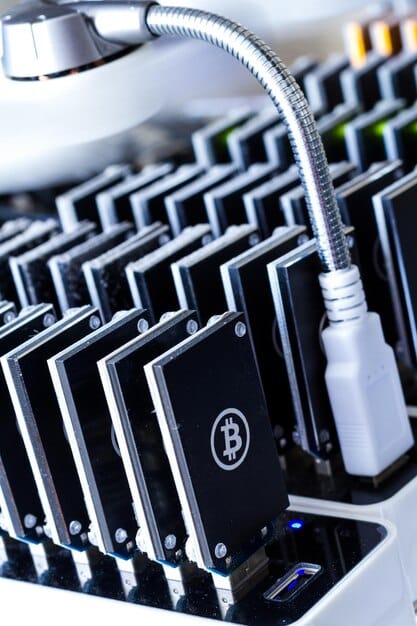Bitcoin Wallets: Security and User Experience in the US

Bitcoin wallets are essential for US users to securely store, manage, and transact their Bitcoin, and choosing the right wallet requires careful consideration of security features, user-friendliness, and specific needs.
Choosing the right Bitcoin wallet: Comparing security features and user experience for US users is crucial for anyone looking to securely manage their digital assets. With so many options available, understanding the different types of wallets and their respective strengths and weaknesses is essential.
Understanding Bitcoin Wallets
Bitcoin wallets are not physical wallets that store coins, but rather software or hardware tools that allow you to manage your Bitcoin. They store the private keys needed to access and spend your Bitcoin, making them a critical component of using the cryptocurrency.
There are several types of Bitcoin wallets, each offering different levels of security, convenience, and control.
Types of Bitcoin Wallets
Here’s a breakdown of the main types of Bitcoin wallets:
- Software Wallets: These are applications you install on your computer or smartphone. They are convenient for frequent transactions but can be vulnerable to malware and hacking if your device is compromised.
- Hardware Wallets: These are physical devices that store your private keys offline, providing a high level of security. They are ideal for storing large amounts of Bitcoin and are less susceptible to online threats.
- Web Wallets: These wallets are accessed through a web browser and are often provided by cryptocurrency exchanges. They offer convenience but are generally considered less secure than software or hardware wallets, as your private keys are stored on a third-party server.
- Paper Wallets: This involves printing your private and public keys on a piece of paper. It’s a cold storage method that’s very secure but requires careful handling and storage of the paper.

Each type of wallet caters to different needs and risk tolerances. Consider how often you plan to use your Bitcoin and how much security you require when making your choice.
Evaluating Security Features
Security is paramount when choosing a Bitcoin wallet. Look for wallets that offer robust security features to protect your digital assets from theft and unauthorized access.
Here are some key security features to consider:
Key Security Features
- Two-Factor Authentication (2FA): This adds an extra layer of security by requiring a second verification method, such as a code sent to your phone, in addition to your password.
- Multi-Signature (Multi-Sig): This requires multiple private keys to authorize a transaction, making it more difficult for hackers to gain unauthorized access.
- Cold Storage: Storing your Bitcoin offline, as with hardware or paper wallets, significantly reduces the risk of online theft.
- Encryption: Wallets should encrypt your private keys to protect them from unauthorized access.
Consider the reputation of the wallet provider and whether they have a history of security breaches. Reading reviews and researching the wallet’s security protocols can provide valuable insights.

Assessing User Experience
User experience is another important factor to consider, especially for those new to Bitcoin. A wallet with a user-friendly interface can make it easier to manage your Bitcoin and avoid costly mistakes.
Look for wallets that offer:
User-Friendly Features
- Intuitive Interface: The wallet should be easy to navigate, with clear instructions and helpful tooltips.
- Simple Transaction Process: Sending and receiving Bitcoin should be straightforward and easy to understand.
- Customer Support: A wallet provider that offers responsive and helpful customer support can be invaluable if you encounter any issues.
- Educational Resources: Wallets that provide educational resources, such as tutorials and FAQs, can help you learn more about Bitcoin and how to use the wallet effectively.
Before committing to a wallet, try out the demo version or watch online tutorials to get a feel for the user interface and functionality.
Top Bitcoin Wallets for US Users
Several Bitcoin wallets are popular among US users, each with its own strengths and weaknesses. Here’s a brief overview of some of the top options:
Choosing the right one depends on your individual needs and preferences.
Popular Bitcoin Wallets
Some popular options for US users include:
- Ledger Nano X: A hardware wallet known for its security and support for multiple cryptocurrencies.
- Trezor Model T: Another popular hardware wallet with a touchscreen interface and advanced security features.
- Exodus: A software wallet with a user-friendly interface and built-in exchange functionality.
- Electrum: A more advanced software wallet that offers greater control over your Bitcoin and privacy features.
When comparing wallets, consider factors such as security, user experience, fees, and supported features. Reading reviews and doing your own research can help you make an informed decision.
Mobile vs. Desktop Wallets
When choosing a Bitcoin wallet, you’ll also need to decide whether you prefer a mobile or desktop wallet. Each offers its own advantages and disadvantages.
The best choice depends on how you plan to use your Bitcoin.
Considerations for Mobile and Desktop Wallets
Here’s a comparison of mobile and desktop wallets:
- Mobile Wallets: These are convenient for on-the-go transactions and are often integrated with mobile payment apps. However, they can be more vulnerable to theft or loss if your phone is compromised.
- Desktop Wallets: These offer greater security than mobile wallets, as they are less susceptible to physical theft. They are ideal for storing larger amounts of Bitcoin and are often used for long-term storage.
Some wallets offer both mobile and desktop versions, allowing you to access your Bitcoin from multiple devices. This can provide a good balance of convenience and security.
Protecting Your Bitcoin Wallet
Regardless of which Bitcoin wallet you choose, it’s essential to take steps to protect your digital assets from theft and loss. This includes:
Practicing safe security habits and keeping your software up to date.
Steps to Secure Your Wallet
Consider these security measure to ensure safety:
- Using a Strong Password: Choose a unique and complex password that is difficult to guess.
- Enabling Two-Factor Authentication: Add an extra layer of security to your wallet by requiring a second verification method.
- Backing Up Your Wallet: Regularly back up your wallet to protect against data loss or hardware failure.
- Keeping Your Software Up to Date: Install the latest software updates to patch security vulnerabilities.
By taking these precautions, you can significantly reduce the risk of losing your Bitcoin.
Staying Informed About Wallet Security
The world of cryptocurrency is constantly evolving, and new security threats are always emerging. It’s essential to stay informed about the latest wallet security best practices to protect your digital assets.
Staying informed protects you from potential threats.
Resources for staying informed
Here are a few pointers on how to stay alert:
- Follow Crypto News and Security Blogs: Stay up-to-date on the latest security threats and best practices by following reputable crypto news sources and security blogs.
- Join Crypto Communities: Engage with other Bitcoin users in online forums and communities to share information and learn from their experiences.
- Be Wary of Phishing Scams: Be cautious of phishing emails and websites that attempt to steal your private keys or other sensitive information.
By staying informed and proactive, you can help protect your Bitcoin from emerging threats.
| Key Aspect | Brief Description |
|---|---|
| 🔒 Security Features | 2FA, multi-sig, and cold storage enhance wallet security. |
| 📱 User Experience | An intuitive interface simplifies Bitcoin management. |
| 🌐 Wallet Types | Options include software, hardware, web, and paper wallets. |
| 🛡️ Protection Steps | Strong passwords and regular backups protect wallets. |
Frequently Asked Questions
▼
A Bitcoin wallet is a digital tool used to store, send, and receive Bitcoin. It holds the private keys necessary to authorize Bitcoin transactions.
▼
There are several types, including software wallets (desktop and mobile), hardware wallets, web wallets, and paper wallets, each offering different security levels.
▼
Consider your security needs, how often you plan to transact, and your comfort level with technology. Hardware wallets offer the best security.
▼
Look for features like two-factor authentication, multi-signature support, encryption, and cold storage options to ensure the safety of your funds.
▼
Use strong passwords, enable 2FA, regularly back up your wallet, and keep your software updated. Be cautious of phishing scams targeting crypto users.
Conclusion
Choosing the right Bitcoin wallet in the US involves understanding your security needs, evaluating user experience, and staying informed about best practices. By carefully considering these factors, you can find a wallet that meets your unique requirements and helps you securely manage your digital assets.





